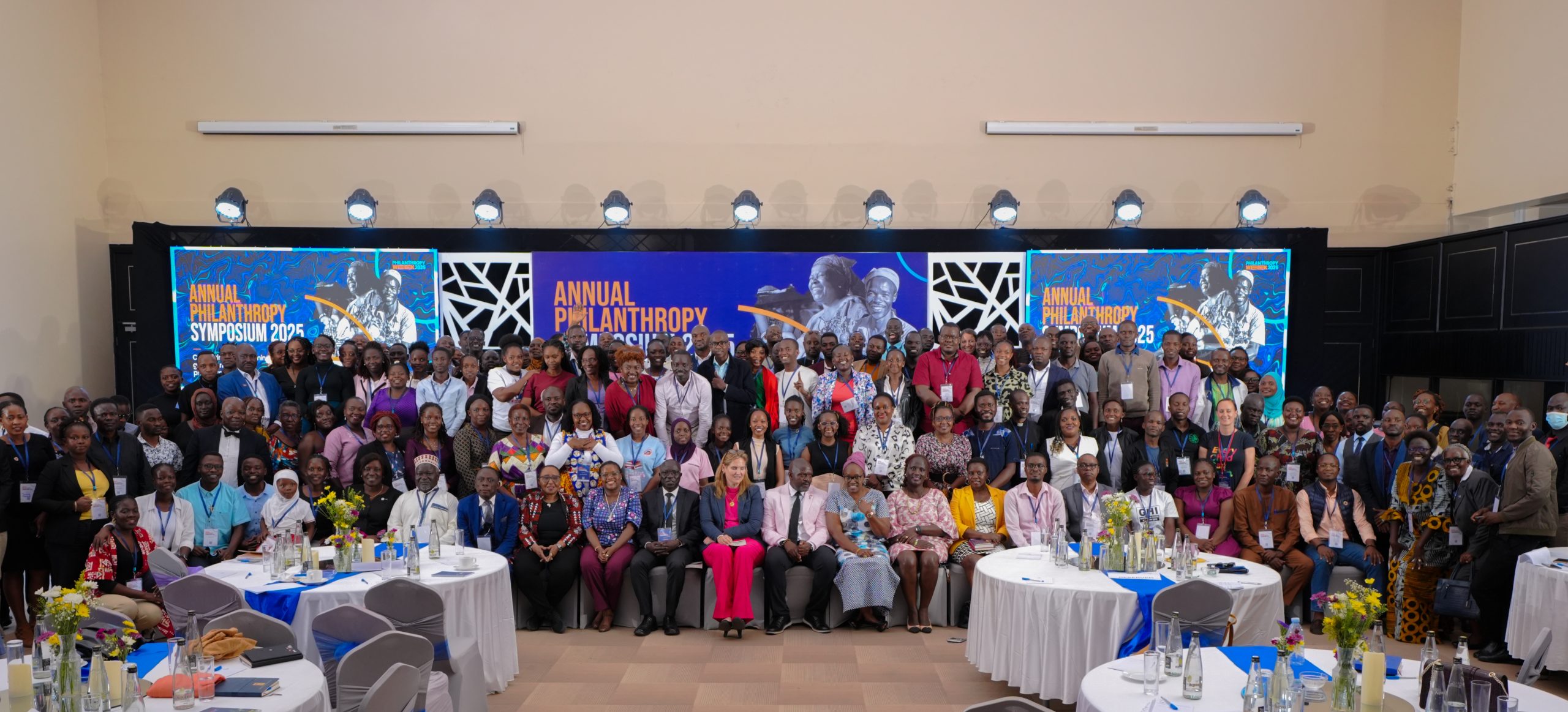
Philanthropy Week 2025: Reclaiming Our Giving Heritage
In a world of shrinking external aid, where large development financiers such as the United States and the European Union are increasingly turning inward in response to internal governance, diplomatic, and economic crises, the landscape of funding for civil society in Uganda (and the global South) has undergone drastic shifts. Sustaining civil society’s contribution to governance and development will depend on reimagining financing with local philanthropy at its core.
To facilitate broad-based reflection on the future of development financing and Uganda’s civil society’s readiness to harness local philanthropy to sustain its work and impact, the Uganda National NGO Forum (UNNGOF) and CivSource Africa convened the first-ever Annual Philanthropy Symposium, under the theme “Celebrating and Reclaiming Giving: Centring Local Philanthropy in Uganda.“ The symposium took place at Mestil Hotel, Kampala, from Monday, 4th to Wednesday, 6th August 2025, with 450 delegates attending in person and hundreds more online.
The symposium featured a variety of events reflecting on the critical levers needed to reframe that narrative around local philanthropy as a legitimate and strategic force for development, foster cross-sector collaboration between civil society, government, and private sector in local development financing, identify the policy, legal, and institutional reforms needed to catalyse local giving, and amplify grassroots voices and practice that are typically excluded from formal philanthropy spaces, and encourage civil society organisations to explore innovative models of resource mobilisation.
Events included a media breakfast on reframing narratives of generosity, a youth dialogue to instigate the formulation of policy to govern and regulate volunteering in Uganda, a private sector roundtable rethinking corporate social responsibility, a dialogue on creating an enabling legal, policy, and fiscal ecosystem for local development financing, and panel discussions presenting alternative models for civil society financing.
The Annual Philanthropy Symposium was part of the 2025 Philanthropy Week — a week of activities celebrating the unique ways in which Ugandans give, and reflecting on the role of local philanthropy in keeping civil society alive and vibrant as it shifts from a pattern of dependence on foreign funding to local resource mobilisation.
HIGHLIGHTS
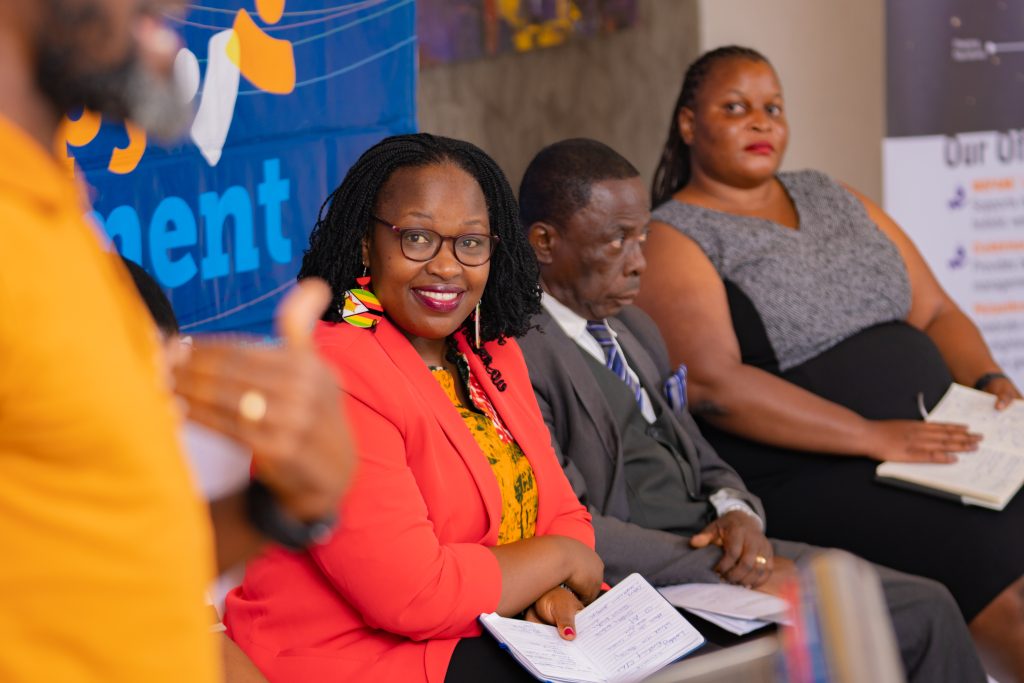
The Media Breakfast showcased inspirational stories of giving initiatives that have successfully leveraged personal networks and public reputation to generate momentum for high-impact interventions on causes ranging from cancer awareness and prevention, sanitary pads for girls in rural schools, road safety, and reducing preventable neonatal deaths. The initiatives spotlighted included high-profile events like the Kabaka Birthday Run and Rotary Cancer Run, which receive prominent coverage in mainstream media and are prominent fixtures in Kampala’s social calendar, to low-profile events that have cut their teeth on social media, like Hike for Girls, Walk for Road Safety, and Ata Breast Milk Community.
Illustrious journalists, Raymond Mujuni (African Institute of Investigative Journalism) and Angela Nampewo (NTV Uganda) flagged off the dialogue with poignant reflections on the power of local giving in transforming ordinary lives, and the media’s duty to amplify their impact. Mujuni spoke on the diverse ways that Ugandans give—from cash donations to volunteering and mobilising community support for education and health fees, wedding celebrations, funerals and such, while Angela Nampewo acknowledged that the current trend in media reporting on local philanthropy is most knee-jack—relying on the invitation of corporate donors with media budgets and rarely provide free coverage to smaller events. They both urged their colleagues in the media to be proactive in looking for stories that celebrate everyday giving as opposed to focusing only on high-profile individuals.
“We were colonised to think that only resources from outside Africa would be the only ones to develop our communities. Through local philanthropy, we can create enough space to reshape the narrative on how Africans give.” – Dr. Stigmata Tenga (African Philanthropy Network)
Moses Isooba (Executive Director, UNNGOF) and Jackie Asiimwe (Executive Director, CivSource Africa) flagged off the Symposium with reminders of how much local philanthropy has fuelled and sustained development in Uganda. Moses Isooba spoke on how customs like bulungi bwa nsi and proverbs like kamu kamu gwe muganda reflect the deep-rooted tradition of generosity and community involvement in our cultural DNA, while Jackie Asiimwe called for solidarity and celebrating our generous spirit.
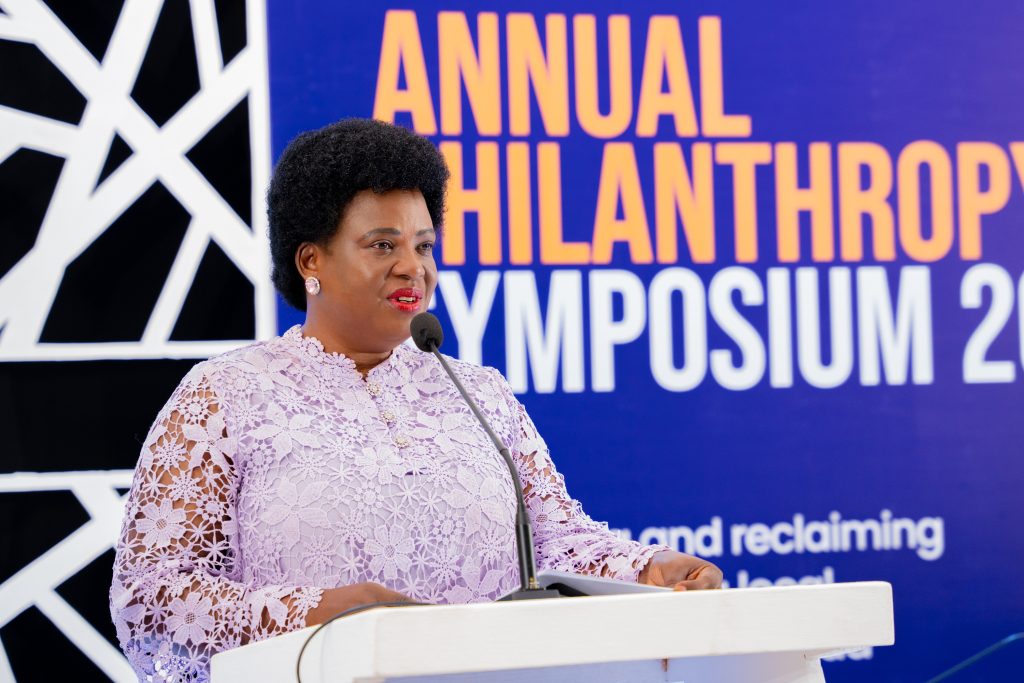
Ugandans are already generous, Jackie noted. Uganda was ranked the sixth most generous in the world by the 2025 World Giving Report, which found that Ugandans gave an average of 2.04% of their income (well above the global average) and approximately 44% volunteered time to a charitable cause, well above the global norm of 26%. This view was corroborated by Hon Betty Among Akena, the Minister of Gender, Labour, and Social Development, who noted that philanthropic investors deployed 100 million US dollars in catalytic capital, accounting for at least 3% of blended finance transactions at the government level.
Notable philanthropists shared inspirational stories of their journeys in local resource mobilisation. Her Royal Highness the Nnabagereka of Buganda, through her representative Dr Maria Nassali, reminded delegates that generosity is not new to Uganda. It is ancestral—embedded in the moral economy of Obuntu Bulamu and expressed in how villages pooled materials and labour to build huts, keeping an extra plate of food for surprise guests, raising orphans and grandchildren together, and looking after widows and elderly persons. While she acknowledged that these traditions are slipping away, she also encouraged delegates to see this symposium as a moment to instigate a renaissance of everyday giving.
“A single seed is enough; you don’t need so much to begin.” – Kofi, Participant
Francis Kamulegeya, an auditor and social entrepreneur who built a school for the deaf in Masaka, challenged delegates to shift from grant-chasing to developing shared goals with businesses and communities. To ensure the school’s sustainability, he set up a food and coffee farm, a solar power and groundwater system to reduce utility costs, and launched a 3000shs a day giving fund to encourage ordinary Ugandans to contribute to tuition and management costs. His compelling talk set the tone for why local philanthropy is a game-changer.
“Generosity is a language the deaf can hear and the blind can see…what you do for others is what endures.” – Francis Kamulegeya, Social Entrepreneur and Philanthropist
LEVERAGING LOCAL PHILANTHROPY FOR DEVELOPMENT FINANCING
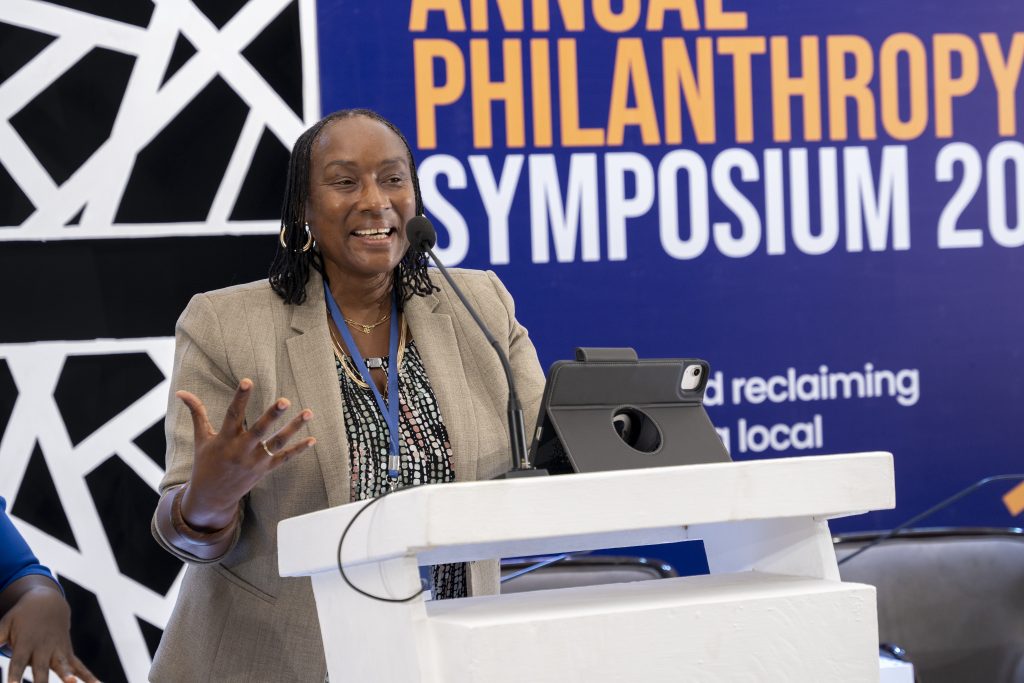
Several speakers encouraged delegates to see the crisis as an opportunity to own and direct the course of our development. Prof. Pamela Mbabazi the Chairperson of the National Planning Authority, lauded the Cooperative model as a successful approach to empowering vulnerable communities and mobilising communal resources for development. Brian Kagoro (Open Society Foundations) reminded delegates that all of Africa’s liberation and democracy struggles were sustained by local philanthropy and encouraged civil society in Uganda to move from fragmentation to collective effort towards self-reliance and decolonising development.
“We need regulations that enable people to do what is logical. The logic of our current laws is based on a Victorian lens, borrowing ideas from an American context, or biased towards state security. We need to rethink regulation as a catalyst, enabler, and amplifier of what Ugandans are doing.” – Brian Kagoro, Open Society Foundation
Leonard Okello (Uhuru Institute) promoted the notion of social business as the future of sustainable civil society. Framing this as a new independence movement, Leonard urged the sector to embrace cooperatives as the model of choice in reorganising civil society to harness local philanthropy and social enterprise for sustainable development.
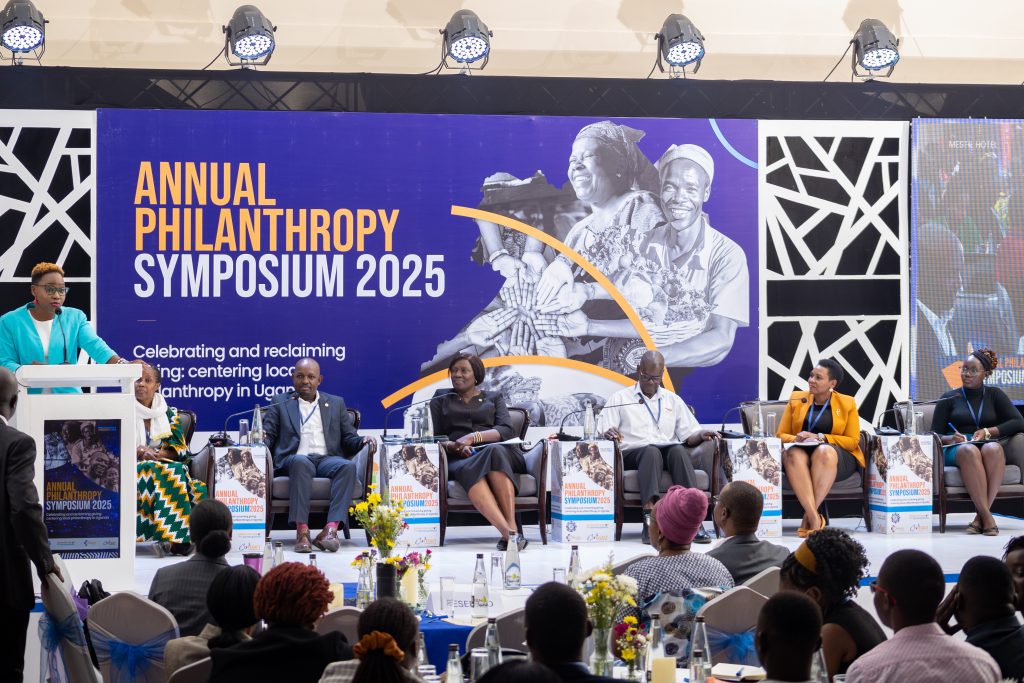
A private sector panel on Corporate Social Responsibility as an alternative stream of development financing underscored the need for sector-wide reform to incentivise partnership with the private sector. Private sector giving is targeted, strategic, and rooted in creating value for their value chain and public image. While Moses Isooba challenged the private sector’s perception that governance work does not align with corporate values, the panellists insisted that corporate actors are accountable to their shareholders first, and encouraged CSOs to pitch their initiatives to companies whose business aligns with the kind of work they do.
“CSOs may be non-profit, but they generate social profit—their work is a net-profit to society that has not been measured. If your issue is road safety, will buying helmets make roads safer, or is it more sensible to advocate for safer roads? We need an honest conversation about values, profit, and governance to realise the convergence between civil society and the private sector.” – Moses Isooba, Executive Director NGO Forum
Between the panels and the parallel sessions, the symposium offered civil society actors a wealth of knowledge, information, and strategies on how to harness the deep wells of generosity that already run through Uganda’s people, businesses, and cultural institutions. What remains to be seen is how the sector adopts the necessary shifts in perspectives to create new streams for financing development.



